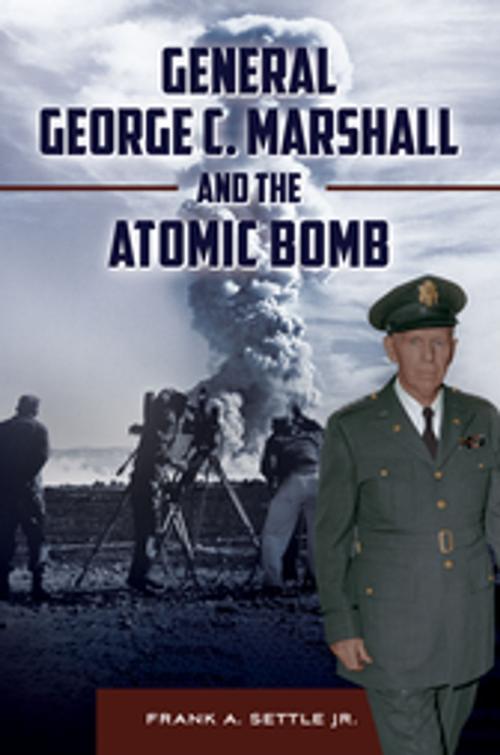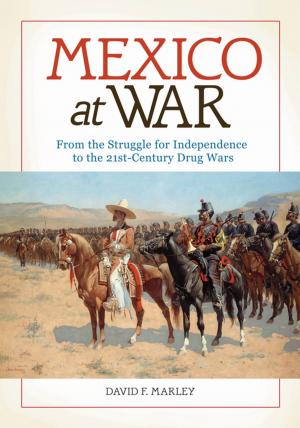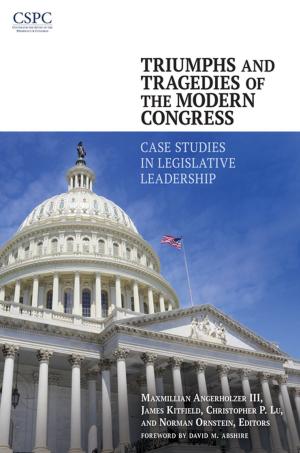General George C. Marshall and the Atomic Bomb
Nonfiction, History, Military, Biological & Chemical Warfare, World War II| Author: | Frank A. Settle Jr. | ISBN: | 9781440842856 |
| Publisher: | ABC-CLIO | Publication: | April 18, 2016 |
| Imprint: | Praeger | Language: | English |
| Author: | Frank A. Settle Jr. |
| ISBN: | 9781440842856 |
| Publisher: | ABC-CLIO |
| Publication: | April 18, 2016 |
| Imprint: | Praeger |
| Language: | English |
The atomic bomb is not only the most powerful weapon ever used in the history of warfare: it is also the most significant in terms of its long-term impact on U.S. military power and policy, and as the reason behind the conflict that raged for four decades without actually happening—the Cold War.
General George C. Marshall played an instrumental role in the development and use of the atomic bomb in World War II as well as in issues involving nuclear weapons in the post-World War II period. This book tells the story of Marshall's experience with the atomic bomb from his early skepticism of its effectiveness as a weapon, to his oversight of its development and deployment against Japan in World War II, to his recognition of the bomb as a weapon of such dire consequence that it should never be used again.
Intended for a general audience as well as scholars with specific knowledge about the subject matter, this book presents a cohesive account of General Marshall's involvement with nuclear weapons and atomic power as Army chief of staff during World War II and as secretary of state and secretary of defense in the early years of the Cold War. Marshall's involvement with the use of nuclear weapons is set in the context of the Allies' efforts to force Japan to surrender and the initiation of the Cold War. Readers will gain insight into Marshall's quest for obtaining a Japanese surrender; his views on the use of the atomic bomb on Japan versus the use of conventional weapons, including fire bombing or poison gas; his interactions with Roosevelt and Truman on nuclear issues; and Marshall's diplomatic skillfulness in dealing with the issues surrounding the control and use of nuclear weapons as secretary of state and secretary of defense in the post-World War II era. These included consideration of the use of the atomic bomb during the Berlin crisis and the Korean war.
The atomic bomb is not only the most powerful weapon ever used in the history of warfare: it is also the most significant in terms of its long-term impact on U.S. military power and policy, and as the reason behind the conflict that raged for four decades without actually happening—the Cold War.
General George C. Marshall played an instrumental role in the development and use of the atomic bomb in World War II as well as in issues involving nuclear weapons in the post-World War II period. This book tells the story of Marshall's experience with the atomic bomb from his early skepticism of its effectiveness as a weapon, to his oversight of its development and deployment against Japan in World War II, to his recognition of the bomb as a weapon of such dire consequence that it should never be used again.
Intended for a general audience as well as scholars with specific knowledge about the subject matter, this book presents a cohesive account of General Marshall's involvement with nuclear weapons and atomic power as Army chief of staff during World War II and as secretary of state and secretary of defense in the early years of the Cold War. Marshall's involvement with the use of nuclear weapons is set in the context of the Allies' efforts to force Japan to surrender and the initiation of the Cold War. Readers will gain insight into Marshall's quest for obtaining a Japanese surrender; his views on the use of the atomic bomb on Japan versus the use of conventional weapons, including fire bombing or poison gas; his interactions with Roosevelt and Truman on nuclear issues; and Marshall's diplomatic skillfulness in dealing with the issues surrounding the control and use of nuclear weapons as secretary of state and secretary of defense in the post-World War II era. These included consideration of the use of the atomic bomb during the Berlin crisis and the Korean war.











![Cover of the book Iconic Mexico: An Encyclopedia from Acapulco to Zócalo [2 volumes] by Frank A. Settle Jr.](https://www.kuoky.com/images/2015/august/300x300/9781610690447-nRcv_300x.jpg)

![Cover of the book Sounds of Resistance: The Role of Music in Multicultural Activism [2 volumes] by Frank A. Settle Jr.](https://www.kuoky.com/images/2013/october/300x300/9780313398063-psVT_300x.jpg)

![Cover of the book Contemporary Supreme Court Cases: Landmark Decisions since Roe v. Wade, 2nd Edition [2 volumes] by Frank A. Settle Jr.](https://www.kuoky.com/images/2016/february/300x300/9781440837135-ekW1_300x.jpg)